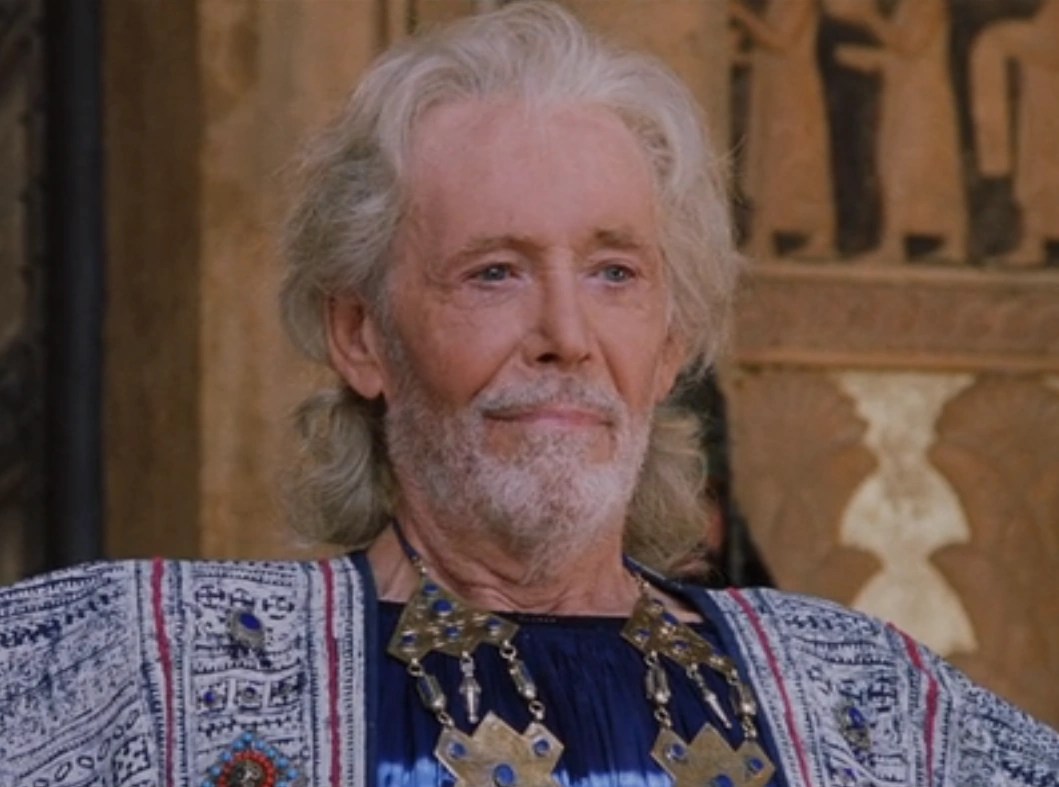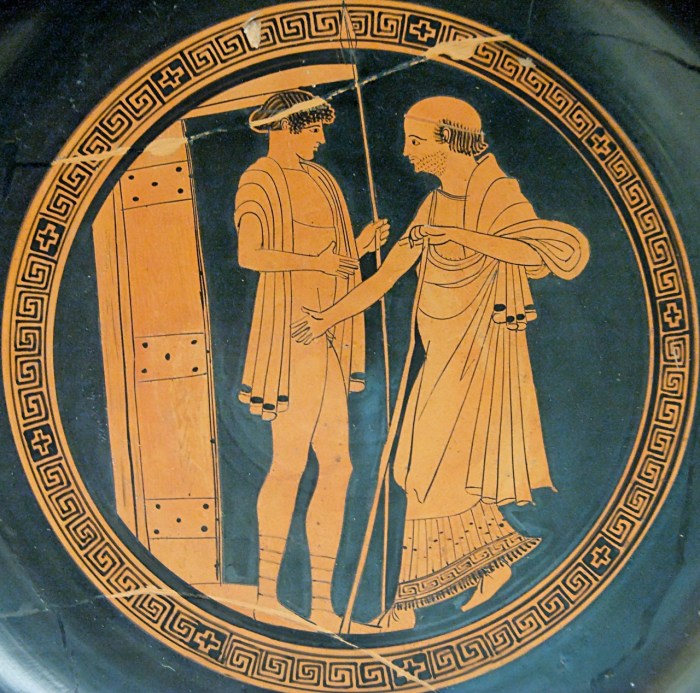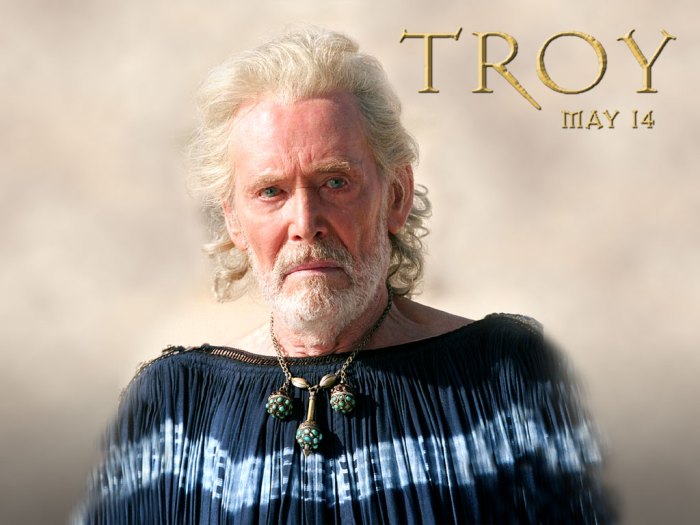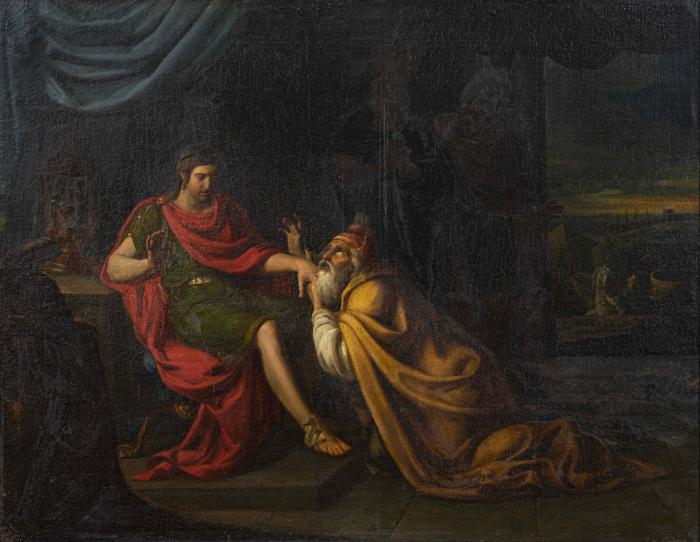Embarking on an exploration of the enigmatic figure behind the father of Hector and Paris crossword, this discourse delves into the captivating realm of ancient Greek mythology, unraveling the intricate tapestry of familial bonds, sibling rivalry, and the inexorable threads of fate.
Priam, the venerable king of Troy, emerges as the patriarch at the heart of this epic tale. His sons, Hector and Paris, stand as pivotal figures, their destinies intertwined with the fate of their besieged city.
Priam: Father Of Hector And Paris Crossword

Priam, the legendary king of Troy, holds immense significance as the father of two pivotal figures in the Trojan War: Hector and Paris.
Priam’s reign was marked by wisdom and prudence, yet he faced a tumultuous fate due to the actions of his sons. Hector, the valiant Trojan prince, became a symbol of courage and sacrifice in the face of adversity. Paris, on the other hand, ignited the war by abducting Helen, the wife of Menelaus, King of Sparta.
Priam’s Character and Role
Priam was a compassionate and just ruler who valued family and tradition. Despite his advanced age, he actively participated in the defense of Troy, demonstrating unwavering loyalty to his kingdom and people.
Impact of His Sons’ Actions
Hector’s heroic battles and ultimate sacrifice brought both honor and sorrow to Priam. Paris’s reckless actions, however, led to the destruction of Troy and the death of countless Trojans, including Hector himself. Priam’s reign ended in tragedy, as he witnessed the downfall of his city and the loss of his beloved sons.
Hector and Paris

Hector and Paris, the sons of King Priam and Queen Hecuba of Troy, were two of the most prominent figures in the Trojan War. While they shared a common lineage, their characters, motivations, values, and actions throughout the conflict were vastly different.
Hector: The Noble Warrior
Hector was the elder brother, known for his unwavering courage, honor, and unwavering loyalty to his family and people. Driven by a strong sense of duty, he became the champion of Troy, leading its defense against the invading Greek army.
Hector’s motivations were primarily rooted in protecting his homeland and upholding the honor of his family. He believed in the justice of the Trojan cause and fought valiantly against the Greeks, despite knowing the odds were stacked against him.
Hector’s values were exemplified by his adherence to the warrior code of conduct. He respected his opponents, fought fairly, and always showed compassion to those who surrendered. His noble nature earned him the admiration of both the Trojans and the Greeks.
Paris: The Prince of Discord
Paris, on the other hand, was a more complex and controversial figure. Known for his beauty, charm, and recklessness, he became the catalyst for the Trojan War.
Paris’s motivations were driven by a desire for personal glory and a thirst for adventure. He was easily swayed by his emotions and often acted impulsively, without considering the consequences of his actions.
Paris’s values were centered around his own self-interests. He was arrogant, selfish, and prone to making decisions that benefited him at the expense of others. His actions, such as abducting Helen of Sparta, led to the outbreak of the Trojan War and brought untold suffering upon his people.
Brotherly Bonds and Destinies
Despite their contrasting personalities, Hector and Paris shared a strong bond as brothers. Hector loved Paris unconditionally, even though he often disapproved of his actions.
Their relationship was shaped by the roles they played in the Trojan War. Hector, the noble warrior, fought to protect his family and people, while Paris, the prince of discord, brought destruction upon them. This fundamental difference in their values and actions ultimately led to their tragic destinies.
Hector died heroically in battle, defending his city against the Greeks. Paris, on the other hand, survived the war but was killed by an arrow shot by Philoctetes, the son of Hercules.
Sibling Rivalry and Family Dynamics

The Iliad portrays a complex dynamic between Hector and Paris, marked by both sibling rivalry and deep affection. Their rivalry stemmed from their contrasting personalities and roles within the Trojan royal family. Hector, the elder brother, was a renowned warrior and the pillar of Troy’s defense, while Paris was known for his beauty and charm, but also for his impulsive and irresponsible behavior.
Impact on Relationship
This rivalry manifested in frequent quarrels and resentment between the brothers. Hector often criticized Paris’s reckless actions, which he believed endangered Troy. Paris, in turn, resented Hector’s authority and envied his military glory. Despite their differences, however, there were moments of genuine affection between them.
When Paris was wounded in battle, Hector rushed to his aid, demonstrating the depth of their bond.
Influence on Priam
Their rivalry also affected their relationship with their father, King Priam. Priam favored Hector, recognizing his military prowess and unwavering loyalty. This favoritism further fueled Paris’s resentment and made him feel like an outsider within his own family.
Impact on the War
The family dynamics between Hector, Paris, and Priam had a profound impact on the course of the Trojan War. Hector’s unwavering loyalty to Troy and his desire to protect his family motivated him to fight bravely against the Greeks. Paris’s reckless actions, on the other hand, often put Troy in danger.
The rivalry between the brothers also created divisions within the Trojan army, as some soldiers supported Hector while others sided with Paris.
Fate and Destiny
In the epic tale of Troy, the lives of Hector and Paris were intertwined with the threads of fate and destiny. Prophecies and predictions cast a long shadow over their actions, shaping their choices and ultimately determining their outcomes.
The Prophecy of Paris
As a young boy, Paris was prophesied to bring about the downfall of Troy. This prophecy, delivered by the seer Cassandra, hung heavy in the air, influencing his every decision. Paris’s fateful choice to elope with Helen, the wife of Menelaus, set in motion a chain of events that led to the Trojan War and the destruction of his city.
Hector’s Choice
Hector, the valiant warrior and defender of Troy, was also bound by destiny. Despite knowing the prophecy of his own death, he chose to fight for his homeland and his family. Hector’s decision to face his fate with courage and determination became a testament to his character and his unwavering loyalty.
The Extent of Choice
While prophecies and predictions played a significant role in the lives of Hector and Paris, the extent to which their choices determined their outcomes is a matter of debate. Some argue that the prophecies were merely self-fulfilling, shaping their actions and leading them down an inevitable path.
Others maintain that the characters had the power to alter their destiny through their own decisions.
Ultimately, the question of fate versus free will remains a complex and timeless one. In the case of Hector and Paris, their actions were shaped by a combination of external forces and their own choices, creating a tapestry of tragedy and heroism that continues to resonate today.
Historical and Literary Significance

Hector and Paris, the sons of King Priam of Troy, hold significant historical and literary importance. Their legendary status stems from their prominent roles in Homer’s epic poem, the Iliad, and their enduring presence in subsequent works of literature, art, and popular culture.
Literary Representation
Hector and Paris have been portrayed in various literary works throughout history. In the Iliad, Hector is depicted as a noble and valiant warrior, the epitome of Trojan heroism. He fights bravely against the Greeks, even knowing the futility of Troy’s fate.
Paris, on the other hand, is characterized as a handsome and arrogant prince, known for his elopement with Helen, the wife of Menelaus, which sparks the Trojan War.
Enduring Popularity
The enduring popularity of Hector and Paris can be attributed to their complex and relatable characters. Hector represents the noble warrior, fighting for his homeland and family, while Paris embodies the flawed but charismatic prince, driven by passion and desire.
Their story resonates with audiences across cultures and time periods, exploring themes of honor, duty, love, and the consequences of human actions.
Artistic and Cultural Impact, Father of hector and paris crossword
Beyond literature, Hector and Paris have also been depicted in numerous works of art and popular culture. From ancient Greek sculptures to Renaissance paintings and modern films, their iconic images continue to inspire and captivate audiences. Their story has been adapted into plays, operas, and films, ensuring their enduring presence in the collective imagination.
Popular Questions
Who is the father of Hector and Paris?
Priam, the king of Troy
What is the significance of the Trojan War in the story of Hector and Paris?
The Trojan War serves as the backdrop for the epic tale, shaping the destinies of Hector, Paris, and their family.
How does sibling rivalry play a role in the relationship between Hector and Paris?
Sibling rivalry fuels their rivalry, influencing their actions and the trajectory of the war.
What is the role of fate in the lives of Hector and Paris?
Fate plays a significant role, with prophecies and predictions shaping their actions and ultimately determining their outcomes.